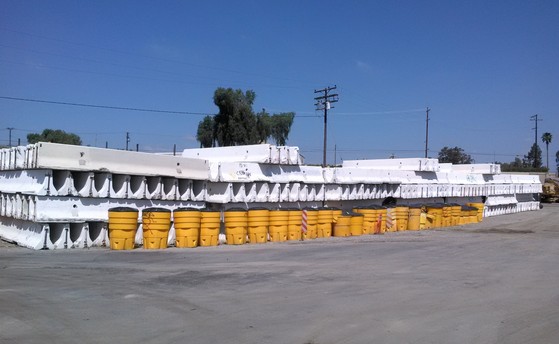So, you’ve decided you need concrete barriers for your next project, but you’re not sure whether you should rent or buy them. With so many options available, the decision can sometimes feel overwhelming. However, it doesn’t have to be. These 5 key factors will help you decide the best choice for you.
1) Budget
As is often the case, your budget will be the main factor determining whether you should rent or buy your barriers. Purchasing barriers is typically cheaper than renting because of freight costs (when renting, you are paying for shipping to and from your location versus one-way shipping costs when purchasing). Start with a solid project plan, and pay close attention to how many barriers you need. This figure will be important for pricing out each option.
It is important to also consider the related costs that come with owning barriers. Moving barriers around and off of your property incurs costs in the form of labor, equipment, fuel, and site prep. Barriers also need to be stored somewhere when not in use. If you do not have existing space to do so, renting, buying, or building a location factors into your final costs. Additionally, equipment to move the barriers can add to the “true cost” of purchased barriers.

2) Timeline
Is your project only a few weeks or months long, or is it a multi-year endeavor? It might not make sense to invest in purchased barriers for a short-term, one-time use. But remember, renting barriers means you have a recurring cost on your hands. The longer your project, the more those fees add up. If you anticipate a timeline of 12 months or longer, we recommend purchasing barriers and then reselling them after your project is complete. For timeframes of less than 12 months, compare the upfront costs of buying barriers to the projected cost of renting. For purchased barriers, don’t forget to factor in the additional costs mentioned above.

3) Space & Equipment
When purchasing barriers, you have to have a transportation and storage plan. Moving a large volume of barriers requires equipment like flatbed trailers, and you will need a forklift or barrier lift to set each barrier in place. Additionally, you will need a site to store your barriers when not in use. Concrete is durable and weather-resistant, so barriers can be stored outdoors with minimal damage. However, some people prefer to have barriers stored in secure facilities or weather-resistant structures. If you already have a location and equipment (or could use these tools for other purposes in your business), purchasing your own barriers might be the right choice for you.
Of the two options, renting barriers is a considerably less involved process. Often, barriers are picked up and dropped off directly at your jobsite, eliminating transportation and storage concerns. All you need to do is put them in place, which can be done easily with a forklift or a barrier lift.

4) Availability
An often overlooked consideration when buying or renting barriers is the availability of the style you need. While standard Jersey barriers are typically commonly available, some of the more unique styles might be harder to find. Aesthetic options like castle guard barriers, bin blocks, and concrete planters might not be available to rent. Alternative sized Jersey barriers might be in limited supply. At 48 Barriers, we recommend calling or requesting a quote to see if barrier rental is available near your jobsite before you begin.
This issue doesn’t strictly apply to rented barriers, either. Special sizes, finishes, colors, and styles sometimes need to be fabricated, which could impact delivery times. Be sure to speak to a representative like the ones at 48 Barriers to ensure your goals align with your project timeline.

5) Other Uses
Concrete is a durable and long-lasting material, and you can expect purchased barriers to last a very long time. Because of their lifespan, consider additional uses for your barriers that will help save costs down the line. For example, if you are purchasing barriers for a new construction project, will there be other projects in the future where those barriers could be used as well? If so, purchasing your own barriers for your current project can reduce costs for your next one. Additionally, having your own barriers on-hand allows for rapid deployment, helping keep your project timeline in check.
If you are struggling to imagine additional uses for barriers, think outside the box. Barriers are more than just safety features — they can designate pedestrian lanes, serve as erosion control, or even be used in emergency management situations. In cases where you simply can’t foresee an additional use for barriers, renting might be the best option for you.

Renting & Buying: Not Your Only Options
If you’ve carefully weighed each factor on this list and still cannot decide whether to rent or buy, there are other options. Purchasing used barriers delivers significant cost savings, and they come in several conditions, including low-grade (major chunks and spalling, some exposed rebar likely), mid-grade (some chips and signs of use), and high-grade (like-new condition).
If purchasing barriers is out of reach financially but feels like the right choice for you, some companies offer financing, like 48 Barriers’ Financing Program. Bridging the gap between renting and buying, this option gives you the benefits of purchasing with the financial flexibility of a payment plan.
In some cases, you can sell your used barriers through a repurchase program, such as 48 Barriers’ buyback program. This grants you flexibility to keep and use your barriers as long as you need but recoup some of your costs (and cut down on storage needs) when you are done with them.
–
Whether you’re renting or buying your barriers, the team at 48 Barriers can walk you through the best solutions for your needs. Give us a call today to discuss your options.




